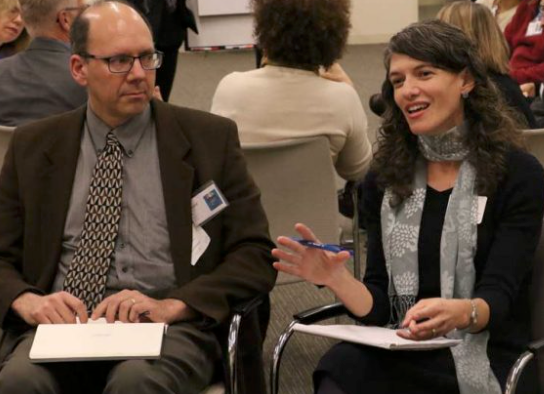You have /5 articles left.
Sign up for a free account or log in.

Edward Balleisen and Maria LaMonaca Wisdom
Duke University
CHICAGO -- Eight-four-two-one. That’s the “mental PowerPoint slide” Leonard Cassuto asked those at a cross-over panel on graduate advising to imagine last week, during the annual meetings of the American Historical Association and Modern Language Association here.
Both conferences happened to take place in the same city this year, and both featured a number of well-attended sessions on rethinking graduate education -- perhaps a sign of growing awareness of a thorny but urgent topic.
For every eight students who begin a humanities Ph.D. program, said Cassuto, a professor of English at Fordham University and author of The Graduate School Mess: What Caused It and How We Can Fix It, about four will not finish. Based on national data, two will leave early on in the program and two later -- the latter departures being what he called “ethical failures” on the part of institutions. Of the four students who do finish, he continued, two will eventually get full-time teaching jobs. Less than one will get a full-time job teaching at a research university.
And yet graduate schools still largely train students based on the premise that they’ll be research university faculty members, he said.
‘A Question of Academic Responsibility’
What can be done about that “utterly irrational” reality, Cassuto asked? He and others on the panel said that advising is an overlooked but essential key to graduate education reform.
“These are teaching problems,” Cassuto said. “And advising is, after all, part of graduate teaching -- arguably the most important kind of teaching.”
Cassuto pitched an idea that he said was at once “humble,” given its simplicity, and “heretical,” given the faculty-centered culture of graduate school: that programs should “reverse engineer” the graduate experience based on students’ actual career outcomes, with graduate advising at the center of that effort.
“What should the dissertation look like going forward, and how should it change to fit these new realities?” for example, Cassuto asked.
“This is a question of academic responsibility,” he continued. Saying that faculty members hold close their academic freedom and sometimes reject administrative guidance on teaching to protect it, Cassuto added, “I haven’t had a freedom worth having that doesn’t come with responsibility. And part of that means looking at graduate school in terms of the student experience.”
Faculty Resistance and Multiple-Adviser Models
Other panelists noted faculty resistance as a major barrier to changing graduate advising.
Rita Chin, professor of history and associate dean of social sciences at the University of Michigan’s Rackham Graduate School, agreed that most faculty members do see advising as part of their teaching role, and therefore a “sacred space.” So it’s difficult to get faculty colleagues to talk about the process of mentoring in order to change it -- at least under pressure, she said. Professors are much more amenable to low-key discussions about “best practices” for advising, however, she said.
One increasingly popular way around the faculty resistance problem is to assign graduate students multiple advisers. That way, if one doesn’t support a graduate student’s true career goals, or if that relationship is otherwise strained, another, hopefully more helpful coach is waiting on the sidelines. Multiple-mentor models are especially timely in the Me Too era, as many critics of the traditional mentor-mentee model say it facilitates or even encourages abuses of power.
Chin said Michigan's incoming graduate students in history are assigned one adviser based on their stated subdisciplinary interests, and another adviser within the broader department. "This means they’re getting an alternative perspective on the kind of advice they’re getting from their primary mentor,” she said. “One of the reasons this has been important to us is that it allows us to rethink the apprenticeship model of individual faculty mentoring, where faculty kind of see their students as their legacy."
Since Michigan's history department also has shrunk graduate cohorts a bit of late, to about 15, all 75 faculty members know they’re not all going to get their own graduate students. They’re therefore more open to a “team-based approach” to advising, Chin said.
Rackham also holds regular meetings and workshops for faculty members to learn about better advising.
Duke University has taken another approach to multiple advisers, creating a grant-funded supplemental adviser position for all 450 humanities and humanistic social sciences graduate students. The idea is that if you don’t want to share your nonacademic career goals with your adviser because you think you’ll be written off, Maria LaMonaca Wisdom can help.
Graduate students often "need to be seen and heard,” said Wisdom, who was a tenured faculty member in English before taking on her new role at Duke about three years ago. For any supplemental adviser, she added, "I'd say a good first step is to help restore to students what doctoral programs all too often strip away -- a student's confidence in her ability to find her own path.”
That often means letting graduate students steer their interactions with her. Sometimes they just need another set of eyes on an academic paper, Wisdom said, in which case her faculty background comes in handy. Often, they need the “gift of time,” as Wisdom’s one-on-one advising sessions rarely last less than an hour. But many desire the ability to be themselves.
Wisdom said she wouldn’t recommend a relationship in which academic advisers “see into students’ souls,” and that the relationship is a business one. But some students have developed such elaborate “workarounds” for their relationships with their advisers that they lead a “double life.” In one instance, she said, a student she’d arranged to meet at a campus coffee shop hid behind a potted plant when her departmental adviser came in, to avoid being seen with someone associated with diverse career advising.
Cassuto said he’d had similar but less dramatic experiences with students. Once a late-stage graduate student told him that he should know she wanted to be a community college teacher. When he said that probably made sense, given that the student had attended a community college herself and loved the experience, the student said, “No. You should know I have always wanted to teach at a community college.” The student had said otherwise previously, including in her application materials, Cassuto recalled.
He also praised the idea of supplemental advising, saying that sometimes people positioned outside of departments can accomplish what in-program professors can’t, mainly for political reasons. While those who resist student-centered approaches are often “old bull” full professors, he said, directors of graduate studies are typically lower-ranking associate professors who may not make too many waves with them.
Wisdom added, “These are things we have to think about until the culture changes.”
Indeed, the question is one of culture, of mindset -- not necessarily radical change, and certainly not radical change in faculty expertise. And some panelists noted that faculty members often actually do want to support students’ nonacademic career goals, but don’t because they believe they don’t know how.
Wisdom said that good advising is, in part, about simply having a “realistic sense of the job market” and “humility.”
Cassuto agreed, saying that a former advisee once told him the best piece of advice he ever gave was to “go talk to someone else.”
Student Resistance
Students also can challenge graduate education reform efforts. Cassuto said he tells students that they must be the CEOs of their own experiences, meaning they should feel empowered to make choices and even employ informal “boards” of advisers.
Panel moderator Edward Balleisen, professor of history and public policy at Duke and vice provost for interdisciplinary studies, and a national advocate for career diversity, asked, “How do we empower graduate students?” Thinking aloud, he said, “I do often tell my students, ‘Don’t take my word as gospel. I’m certainly not always right, and mine is not the only perspective.’”
Beyond the “double life” problem, students often resist the nonacademic career question. Wisdom said that she’s learned that talking about this with new graduate students can scare them away from her. So when she hosts a dinner for first-year students, she focuses on other topics entirely. She takes the same approach with faculty members when she first meets them and "networks like crazy" instead of pushing any one agenda.
Balleisen also wondered about timelines by which advisers should engage students in talks about career diversity. On the one hand, he said, doing so when brainstorming dissertation topics seems too soon. On the other, it seems like an opportune time to shape that project around emerging career goals.
During a question-and-answer period at a later joint-conference panel on innovations in graduate education that Balleisen also moderated, Alicia DeMaio, a Ph.D. candidate in history at Harvard University, said students who demonstrate bravery in being honest with their advisers might just be pleasantly surprised.





